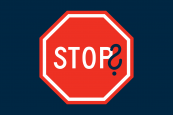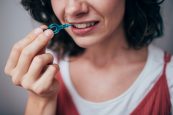Did you know that over-brushing is a thing? And when is spitting OK?

1. The myth about strength: the harder you brush your teeth, the cleaner they will be.
Reality: Have you ever wondered why we brush our teeth? Obviously, we do it to keep them healthy, but what we’re really doing is breaking down dental plaque: a soft layer of bacteria and leftover bits of food that cover your teeth.
And because the layer is so soft, there’s really no need to use force. Gentle strokes with a soft brush do the trick.
Brushing too hard can damage both the protective enamel and the gums around your teeth. In other words, brushing too hard can actually lead to cavities and inflamed gums.

2. The myth about food: I have to brush my teeth after every meal.
Reality: Over-brushing can do more harm than good. When you eat, the acidity in your mouth increases to help you break down the food. Brushing while these acids are still active rubs them deeper into the enamel and damages your teeth.
Luckily, your mouth has a natural solution. It uses saliva to neutralise the acids and rinse your mouth. Let your body do its job and wait at least 30 minutes after a meal before brushing.

3. The myth about blood: bleeding gums are bad and I should stop brushing them
Reality: Don’t freak out if you see blood in the sink while taking care of your teeth. And don’t stop brushing either, as you don’t have to worry about irritating your gums even more. While it’s true that healthy gums do not bleed, blood is actually the solution in this situation, not the problem.
If your gums are bleeding, it means your body is sending antibodies to help the gums deal with harmful bacteria. And the best way to get rid of the bacteria that are causing the bleeding is to keep brushing and cleaning the space between your teeth with an interdental brush.

4. The myth about water: I have to rinse my mouth after brushing my teeth
Reality: This is one of the most common misconceptions about oral health. A study conducted in the UK showed that two in three people rinse their mouth with water after brushing their teeth.
However, rinsing with water or mouthwash immediately after brushing washes away fluoride, the most important ingredient of toothpaste. Fluoride protects the tooth enamel and helps maintain acidity levels in the mouth. You can boost the effectiveness of fluoride if you just spit out the toothpaste instead of rinsing.

5. The myth about pain: as long as I’m not in pain, I don’t need to go see the dentist
Reality: Pain or increased sensitivity to cold are usually signs that you should have gone to see your dentist sooner. It can take a while before cavities and gum disease start to hurt.
A hard toothbrush can cause your gum line to recede, but you might not feel that there is something wrong until the sensitive tooth necks are exposed. Your dentist can spot these problems early and teach you how to avoid them. Even if your teeth are healthy, you should have a check-up at least once a year.


